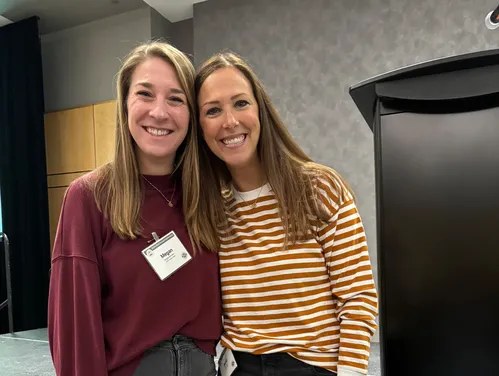For this week’s National School Counseling Week, let’s take a look at one of Iowa’s many high-quality school counseling programs.
The Cedar Falls Community School District’s school counseling program at Peet Junior High School is setting the standard for what school counseling programs can achieve. Led by the school counseling duo of Becky Lins and Megan Bowden, Peet’s school counseling program helps students with everything from academics to mental and behavioral health to college and career readiness.
“We believe it is our duty to serve and support all 700 kids in the building,” Lins said. “We can make an impact on our students, whether that is working with kids in the classroom, meeting individually or providing small group sessions.”
Lins and Bowden take a proactive approach to school counseling by identifying gaps and putting themselves in front of students before problems arise. They go into classrooms to collaborate with teachers on interventions and emerging topics and communicate with parents on what resources a child may need to find success.
“The old school image of school counseling is that it’s reactive only and we’re waiting for students to approach us,” Bowden said. “There are no random acts of guidance at Peet. We’re continuously collecting and reviewing data to make informed decisions on what interventions are working and what is needed for our students.”
In Iowa, a school counseling program is a comprehensive K-12 program that incorporates prevention and evidence-based practices and is a part of the school district’s overall curricula and instruction. The Iowa Department of Education provides the Iowa School Counseling Framework (4.86 MB) .pdf to guide and assist school counselors who are implementing comprehensive school counseling programs. It is based upon the American School Counselor Association (ASCA) National Model and was recently updated for school districts.
“High-quality, comprehensive school counseling programs are vital for student success,” said Erica Woods-Schmitz, Department school counseling consultant. “School counselors can impact so many achievement areas, such as academic success, postsecondary decision-making, reduction of disciplinary actions, improved attendance and much more.”
Along with the Iowa School Counseling Framework, Lins and Bowden have used a national review process to ensure they are providing quality school counseling services. Peet has been designated as a Recognized ASCA Model Program, better known as RAMP, for a second time. RAMP is an extensive application process that confirms through data and documentation that a school counseling program is following a recognized model and framework to provide the best outcomes for its students. For a comprehensive program, schools must show how they deliver services, define standards, manage the work and assess the effectiveness of their interventions. Schools can receive a RAMP designation for a five-year period, and only two other schools besides Peet currently hold a RAMP designation in Iowa for their school counseling programs.
“At first, it can sound like a daunting task to go through the RAMP process, but it truly makes an impact on your school counseling program,” Bowden said. “It has made our program more efficient, and the feedback we’ve received has been really insightful. It’s not meant to be a markup of what you’re doing wrong. It’s something that helps prompt you to make improvements on how you are reaching your kids.”
Lins and Bowden have used the information received through their RAMP designation to help students in various areas. For instance, they assist all eighth grade students with starting the required Individual Career Assessment Plan (ICAP) and initiating discussions on potential interests and career exploration. The two also assist students with transitioning from elementary to middle to high school and learning about digital citizenship.
“We wear a lot of hats,” Lins said. “School counselors have the unique position to see where we can help our students move forward successfully to high school and later graduation. We are helping students build durable skills and ensure they don’t fall through the cracks.”
Although school counselors do not provide ongoing individual mental health counseling sessions, Lins and Bowden noted that mental health, wellness and safety are still a big part of their school day. They work with students who are facing challenges, such as mental health, homelessness, substance abuse, domestic violence and sexual abuse, among others. Through the school counseling program, students can receive connections to resources, helpful communication to parents and immediate assistance.
“At the core, we are advocates for students and work toward providing a safe school environment for everyone,” Lins said. “We are fortunate to have many resources in our Cedar Falls community and can help students and their families make connections.”
Strong school counselors in Iowa, such as Lins and Bowden, often need outside supports of their own to bounce ideas and share best practices. Through the Iowa School Counselor Association (ISCA), both counselors have found a sense of community and a way to hear about trending issues in schools across the state. Additionally, both school counselors have even found acclaim through ISCA. Lins has been elected as the current president of ISCA, and Bowden was named the ISCA Middle School Counselor of the Year.
“It’s important to celebrate and support each other,” Bowden said. “We sometimes forget that we are the experts in the field and are doing good things. It’s awesome to reflect on what we’ve accomplished during the past year and see the difference we’ve made in our schools.”
Comprehensive school counseling programs are impacting school districts across the state and are providing valuable supports to their students. For Lins and Bowden, they are dedicated to their school counseling program and how its alignment to the state and national models are providing more opportunities for the students at Peet.
“I’m really proud of our efforts,” Lins said. “But the work in school counseling is never done. We will continue to review data, meet with students and assess how we can make improvements – because it’s worth it to be proactive.”
*National School Counseling Week is Feb. 3-7.
